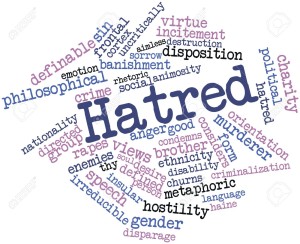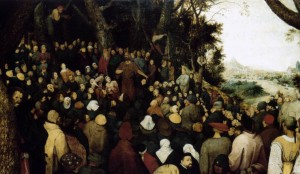 I have been reflecting on the way that hatred is something that is encouraged in both political and religious life. In particular hatred is used by leaders to bind people together in targeting a despised group, and this is particularly true in a situation of war. To fight a war, the enemy has to be categorised as being despicable, unworthy of any sympathy and thus to be destroyed. It would probably be true to say that hatred is normally much more a group phenomenon. It is always easier to feel hatred when you know that other people are feeling the same way. Many of our newspapers are good at rousing passionate hatred against particular groups, whether asylum seekers, gays, social security scroungers or politicians who fiddle their expenses. Much political life centres round the arousing of enmities between social classes and nations. One fears that the vote about the European community will be decided, not on the rights and wrongs of the case, but on what people feel about the situation. Does a feeling about foreign nationals boil over into a form of hatred? If the feeling is that strong, it is likely to play a part in the way we vote.
I have been reflecting on the way that hatred is something that is encouraged in both political and religious life. In particular hatred is used by leaders to bind people together in targeting a despised group, and this is particularly true in a situation of war. To fight a war, the enemy has to be categorised as being despicable, unworthy of any sympathy and thus to be destroyed. It would probably be true to say that hatred is normally much more a group phenomenon. It is always easier to feel hatred when you know that other people are feeling the same way. Many of our newspapers are good at rousing passionate hatred against particular groups, whether asylum seekers, gays, social security scroungers or politicians who fiddle their expenses. Much political life centres round the arousing of enmities between social classes and nations. One fears that the vote about the European community will be decided, not on the rights and wrongs of the case, but on what people feel about the situation. Does a feeling about foreign nationals boil over into a form of hatred? If the feeling is that strong, it is likely to play a part in the way we vote.
One of the political tricks used by Peniel/Trinity Brentwood was the encouragement of an ‘us-them’ culture in their church. Members of the congregation are encouraged to feel that their church was superior, not only to other local churches, but to all the churches in the land. Once this sense of superiority has been nurtured in the congregation, it is a small step to make to start despising, even hating, other groups of people. Michael Reid was particularly good at this. He was skilled in convincing parents in the church to send their children to the church school by telling them that at local schools, children were taught by the devil. This was obviously a reference to the fact that issues of equality, tolerance and respect were taught in the schools. The Calvinist doctrines around the saved and the unsaved encouraged a binary way of thinking, and the practising of hate is going to be part of the way that a group of people are going to be controlled. We are one because we all hate the same things. Hitler welded the German people together by giving them a common object to hate and sometimes it is hard to see a great difference in the way that Christians behave.
It is a good idea when we find ourselves feeling irrational hostility to an individual or a group of individuals to examine ourselves and ask what is going on. Hatred of any kind is more likely to be saying something about us. Something about the behaviour, belief system or appearance of another person has evoked negative feelings in us and these need to be brought out into the open. We may feel hatred for another person or group because they make us feel inadequate in some way. Hatred may emerge when we are jealous of the achievements of another person. This kind of jealousy says something about our failure to discover contentment in what we are and what we do. We may be harbouring unrealistic ambitions and in this way making ourselves thoroughly unhappy. The same is true when we find ourselves agreeing with the newspaper about immigrants, workshy people or another despised group in society. I know some people have a deeply irrational reaction to the existence of gay people. One has to speculate what is going on internally that makes them so passionate about this issue when most of us are content to live and let live. Strong irrational feelings about anything often come from a part of the personality which has little to do with our Christian identity or our rational thinking side.
Hatred is a powerful but an irrational emotion. We owe it to ourselves and to our Christian integrity to be prepared to search within ourselves to find out where this powerful feeling comes from and what it is truly expressing. We will find, to our shame, that most hatred is unworthy and evil. It also involves a massive expenditure of energy which we would do better to avoid. One of the key ideas of Christianity is that of forgiveness. Forgiveness is not just about passing over the offences of others, it is also about forgiving ourselves for such things as hatred and passionate irrational dislike of others. Using our minds, our Christian consciences and our insight, we can learn a new way of dealing with the foibles and differences that are found in other people. We must learn particularly be on our guard against joining in a mob hatred towards groups of others, particularly when this hatred is being encouraged by a Christian leader. Sadly at this moment in the church there are quite large constituencies of Christians who are being caught up in a kind of mob hatred for other Christians who are not like them. The meeting of the Anglican primates in January in London is going to be an interesting affair. The question that has to be asked of the leaders of the church, particularly those from Africa, is whether institutional hatred should be allowed to dominate the discussions. The leaders may not realise it, but it seems clear that Christian groups in America and Australia are trying to manipulate and encourage hatred as they play a complicated power game within the Anglican communion. Such hatred must be challenged and not allowed to win. We will see whether the Archbishop of Canterbury and other Anglican leaders are able to stand up to this attempt at manipulation which we would claim is grounded in a passionate irrational hatred.
In combatting hatred whether the group kind or that built on individual dislike, we have two very simple antidotes from our Christian tradition. The first, a paraphrase from the Lord’s Prayer, say simply ‘forgive as you are forgiven’. The second command also summarises much Christian teaching which is ‘love, as you are loved’. If every Christian could really internalise these commands, our world might be a better place. Hatred is in fact like a poison that wants to corrupt and damage everything in its path. We must meet that poison to neutralise it with the tools that we have been given. Hatred is never the Christian option. It must be resisted and shown to be entirely contrary to the spirit of Jesus and the path that he teaches us to follow.






